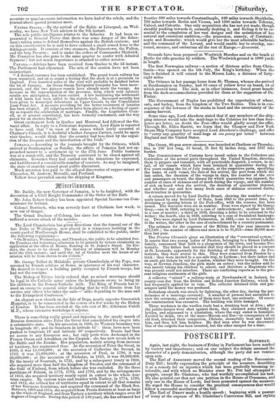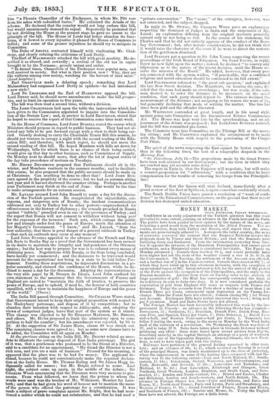POSTSCRIPT.
SATURDAY.
Again, last night, the business of Friday in Parliament has been marked by variety and importance ; and on one subject the debate assumed the character of a party demonstration, although the party did not venture upon acts.
The Earl of ABERDEEN moved the second reading of the Succession- Duty Bill ; briefly expounding the principle of the measure, describing it as a remedy for an injustice which has been gradually becoming in- tolerable, and with which no Minister since Mr. Pitt had attempted to grapple, except Mr. Gladstone, who had worthily accomplished his task. He also pointed out that not one petition in the House of Commons, and only one in the House of Lords, had been presented against the measure. He urged the House to consider the practical consequences that would follow a successful mutilation of the bill.
The Earl of DERBY made a hostile speech ; beginning with a passage of irony at the expense of Mr, Glarbitone's Conversion Bill, and styling him "a Phenix Chancellor of the Exchequer, in whom My. Pitt rose from his ashes with redoubled lustre." He criticized the details of the scheme. Be declared that the country would not long endure this bill, but would unanimously demand its repeal. Repeatedly he protested that by not dividing the House at the present stage he gave no assent to the principle of the bill. The House of Lords had better abandon its func- tions, if it bowed to every injustice it pleased the House of Commons to inflict; and some of the grosser injustices he should try to mitigate in Committee.
The Duke of ARGYLL contented himself With vindicating Mr. Glad- stone and closely refuting the criticisms of Lord Derby. TLEarl of MALMESBURY attacked the bill with great acerbity. He de- scribed it as absurd, and cowardly ; a revival of the old tax in capite brought in by the Normans; grossly unjust and unfair. " In former times, Chancellors of the Exchequer were popular men, and well received in society. But what is their position now ? Why, they are like vultures soaring over society, watching for the harvest of dead meat."
(Loud laughter.) •
Earl GB.ANVILLE made a debating speech ; remarking that Lord Malmesbury had surpassed Lord Derby in epithets—he had introduced a new style!
Lord ST. Lamcia.ns and the Earl of HAHROWBY opposed the bill. Lord DERBY said, he should move amendments to make the bill prospec- tive, and to limit its operation to five years.
The bill was then read a second time, without a division.
The LORD CHANCELLOR laid upon the table the instructions which had been given to the Commission appointed to inquire into the Consolida- tion of the Statute Law ; and, in answer to Lord BROUGHAM, stated that he hoped to receive the report of that Commission some time next week.
In the House of Commons, Lord JOHN RUSSELL stated the course which Ministers should propose in regard to public business. They had not al- lowed any bills to be put forward except with a view to their being car- ried. Greatly desiring to carry the Charitable Trusts Bill this session he should not venture to occupy a night with the second reading of the session,
Bill ; and therefore, with much regret, he should not move the second reading of that bill. He hoped Members with bills set down for Wednesdays, bills for which there is no chance of their being carried, would give up that day to other business, such as Committees of Supply. On Monday next he should move, that after the 1st of August orders of the day take precedence of motions on Tuesdays.
Mr. HENRY DRUMMOND proposed that Parliament should sit in the winter, and Members rustioate in the summer months ; and to facilitate this course, he also proposed that the public accounts should be made up at Christmas. Can anything be done to effect that ? Lord Jolla]. Rus- s= agreed in the propriety of the course; but we had an autumn sitting last year and it has not shortened the summer sitting. Perhaps in another year Parliament may finish at the end of June : that would be the time to make arrangements for an autumn session.
Mr. Laymen pressed Lord John Russell to name a day for the discus- sion of the Turkish question. He recapitulated the unjustifiable, out- rageous, and dangerous acts of Russia ; the insolent communications addressed not only to Turkey but to other powers—unprecedented for offensiveness in the history of diplomacy; the crusade preached in Russia against "infidels," preached even in one of the provinces of Turkey ; and the report that Russia will not consent to withdraw without being paid for the expenses of the invasion ! Such acts, which outrage the public law and trample under foot the peace of Europe, merit the attention of her Majesty's Government. "I know," said Mr. Layard, "from the best authority, that there is great danger of a general outbreak in Turkey —that such an outbreak may occur at any moment."
Lord Jourr RUSSELL appealed to the advance of the French and Eng- lish fleets to Besika Bay as a proof that the Government has been earnest in its desire to maintain the integrity and independence of the Ottoman empire; but the best way to prepare for war is to exhaust every means of obtaining peace. Negotiations with Russia, so far from being concluded, have hardly yet commenced ; and the distances to be traversed would account for the negotiations' not being in a state to be laid before Par- liament. Pending those negotiations, he deprecated discussions in a po- pular assembly, and claimed the confidence of the House, while he de- clined to name a day for the discussion. Adopting the representations in the very able paper by M. Drouyn de Lhuys, Lord John confined his own statement to the assurance that the Governments of France and England are united to "maintain the faith of treaties, to preserve the peace of Europe, and to uphold, if need be, the honour of both countries unsullied, with a view to maintain the happiness of Europe and the peace of the world." (Cheers.) The India Bill passed through Committee. Sir CHARLES WOOD stated, that Government intend to keep their original proposition with respect to the Haileybury patronage, and dispose of it by competition; but to abandon their intention with respect to Addiscombe, and, adopting the views of competent judges, leave that part of the system as it stands. This change was objected to by Sir HERBERT MADDOCK, Mr. BRIGHT, and others. Mr. Hums proposed to limit the admissions open to com- petition to half the number ; but his amendment was rejected, by 93 to 39. At the suggestion of Sir JAMES Hooci, clause 40 was struck out. The remaining clauses were agreed to ; but as some new clauses have to be added, the Committee will sit again on Monday.
At the previous sitting on the India Bill, Mr. BRIGHT related an anec- dote to illustrate the corrupt disposal of East India patronage. The gist of it was, that a gentleman who professed to be the friend of a Director, said to a candidate for an appointment, "My friend the Director is not a rich man, and you are a man of business." Pressed for his meaning, it appeared that the place was to be had for money. The applicant de- clined, because he could not conscientiously make the required declara- tion at the India House. Mr. Thomas Baring and Sir James Hogg in- dignantly called for names; but Mr. Bright refused to name. Last night, the subject came up again, in the middle of the debate ; Sir Cusarms WOOD announcing that the Directors were very anxious to pro- secute. From what followed, we learn that the person to whom the words were used was the brother of Mr. Wilkinson, Member for Lam- beth; and that he had given his word of honour not to mention the name of the person who offered the patronage for a consideration. It was made a subject of grave complaint against Mr. Bright, that he had men- tioned a matter which he could not substantiate, and that he had used a
"private conversation." The " name " of the corrupter, however, was not extracted, and the subject dropped.
In reply to Mr. OTWAY, Sir CHARLES WOOD gave an explanation respecting the dismissal of Judges in India and the suspension of Mr. Luard ; an explanation differing from the original accounts generally current only in not being so full. In the course of his statement, Sir Charles said that he did not entirely approve of the conduct of the Bom- bay Government ; but, after mature consideration, he did not think that it would raise the character of the court if he were to direct the restora- tion of the gentlemen dismissed.
Lord STANLEY put a question to Sir John Young respecting the recent proceedings of the Irish Board of Education. Sir JOHN YOUNG, in reply, threw no new light upon the matter ; indeed, he declined "to convey any inipression as to the nature of the recent decision, until the House re- ceive the minutes of the Board." Ile added, however, that every per- son connected with the system wishes, "if practicable, that a combined religious and moral education should be continued to its full extent."
Lord PALMERSTON referred to "the great cab question," and explained the late Bow Street decision. The Magistrate, on hearing the case, de- cided that the man had made an overcharge ; but was ready, if the cab- man desired it, to order the distance to be measured, on the usual condition, that each party should deposit 5s. The cabman declined the measurement of the distance ; not assigning as his reason the want of 5s., but generally declining that mode of settling the matter. The fine has since been paid and the offender liberated.
Mr. WHITESIDE contended at great length, and in his usual style, against going into Committee on the Encumbered Estates Continuance Act. The House was kept very late by the speechmaking, and an ad- journment of the debate was proposed ; but Lord JOHN RUSSELL resisted, and the bill was committed pro forma.
The Commons went into Committee on the Pilotage Bill at the morn- ing sitting; and Mr. CARDWELL explained the arrangement to be made with the Trinity House with respect to the pensioning of the Cinque Port Pilots.



































 Previous page
Previous page